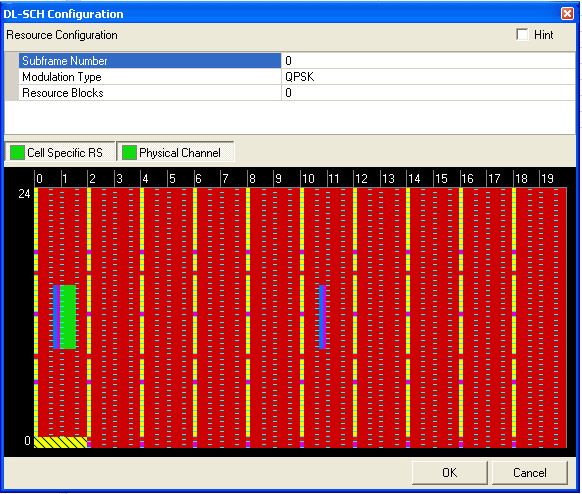 in theTransport
Channel node and select DL-SCH or select an existing DL-SCH channel
in the Transport channel node and click the Edit Channel Configuration
button
in theTransport
Channel node and select DL-SCH or select an existing DL-SCH channel
in the Transport channel node and click the Edit Channel Configuration
button  to open the Configure DL-SCH window.
to open the Configure DL-SCH window. Before adding a DL-SCH channel as described below, delete the default DL-SCH in the Transport Channel node (or any configured DL-SCH that occupies resource blocks that your new DL-SCH will occupy). If you add a new DL-SCH without deleting a conflicting DL-SCH, a "code conflicted" error appears in the Status Bar and the Status Window when you generate the waveform.
Click the Add Channel button
 in theTransport
Channel node and select DL-SCH or select an existing DL-SCH channel
in the Transport channel node and click the Edit Channel Configuration
button
in theTransport
Channel node and select DL-SCH or select an existing DL-SCH channel
in the Transport channel node and click the Edit Channel Configuration
button  to open the Configure DL-SCH window.
to open the Configure DL-SCH window.
The following figure shows the Configure DL-SCH window with the default settings after deleting the existing DL-SCH channel shown in Transport Channel. The currently configured DL-SCH is shown in yellow in the resource mapping graph at the bottom of the window.

Enter the subframe number(s) for the DL-SCH to occupy. You can enter multiple subframes, separated by commas (for example 1,3,5) or a range of subframes (for example 1-5).
Select QPSK, 16 QAM, or 64 QAM as the modulation type for the DL-SCH.
Enter the number(s) of the resource block(s) for the DL-SCH to occupy in both slots of the subframe. You can enter multiple resource blocks, separated by commas (for example 1,3,5) or a range of resource blocks (for example 1-5). Your new configuration is displayed in yellow in the resource mapping graph at the bottom of the window.
Click to create your configured DL-SCH channel. The software automatically creates the appropriate PDSCH channels in the Physical Channel node.